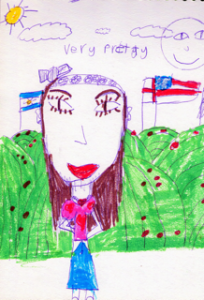A few weeks ago I took my eldest daughter out after school, just her and me. She had a sleepover near school so I picked her up at the front gates instead of her taking the school bus home. We had two hours to kill. We walked through Plaza San Martin near downtown Buenos Aires and went to Aroma for a drink.
This is Argentina. We speak English to each other and Spanish to most everybody else. This can draw looks. We don’t care. It’s how we live. It’s how the eight-year-old and her younger brother and sister are growing up, speaking two languages, one at home and the other at school and with most of the rest of society.
We ordered our drinks and waited at the front counter, and then we went upstairs and sat down.
Her Spanish is native. She can trill her tongue for a perfect Spanish double R, a common sound that I cannot do for the life of me, even though my father is Argentine. It’s something that for the most part you have to learn as a kid. She did. She can rip off ferrocarril, garrapata, herrero, perro and tierra as easy as anything. I didn’t learn Spanish until my twenties and so I struggle to make these words sound like good Spanish, relying on the rest of the Spanish sounds to come across with an accent that is almost there, almost like everybody else here but not quite. Just almost until, of course, a word with the double R. That’s not that my forte. It is my daughter’s – she is a native Spanish speaker.
We started chatting in the coffee shop. I told her a funny story, she told me about her day at school.
I told her about my day, a lunch for work and then a recording session, not music, not a movie. Simply a voiceover.
My daughter’s face sank.
“Did you have to say the double R?” she asked.
“No, it was in English, not Spanish,” I said, laughing.
Her face brightened.
My face darkened.





